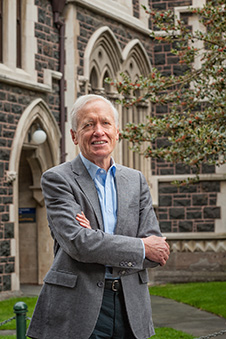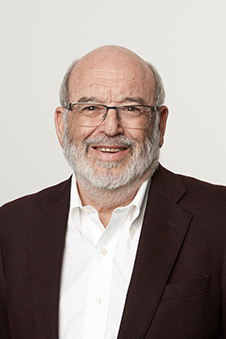Two top New Zealand scientists are key members of a new international panel mapping future COVID-19 scenarios.

Sir David Skegg.
Epidemiologist Professor Sir David Skegg of the University of Otago and Professor Sir Peter Gluckman, the President-elect of the International Science Council (ISC) are part of an oversight panel for the recently launched ISC Covid-19 Scenarios Project.
The panel was announced today in the world-leading medical journal The Lancet in a commentary Future scenarios for the COVID-19 pandemic co-authored by Sir David and Sir Peter and panel members Geoffrey Boulton, Heide Hackmann, Salim Abdool Karim, Peter Piot, and Christiane Woopen.
The panel of international science leaders also includes representatives from the World Health Organization, the United Nations Office for Disaster Risk Reduction (UNDRR), an advisor to President Biden's Covid-19 advisory board and other microbiologists and epidemiologists.
Within eight months, the panel will report on the possible COVID-19 scenarios the world faces over the next three to five years, and on the choices for governments, agencies, and citizens.

Sir Peter Gluckman.
Sir Peter, who heads Koi Tū: The Centre for Informed Futures at the University of Auckland, initiated the ISC project. He says decisions made by governments and individuals over coming months will impact on how the world recovers from the pandemic over the next three to five years.
“At some stage the world will be dealing with a low level of endemic virus infection and global economic and social life will be recovering, but how we get there depends on many decisions by governments and individuals.
“While vaccines offer much hope, the battle against the virus is not yet close to being won. Different countries are in very different stages of the pandemic, the virus evolves, and access to vaccines and gaining effective lasting immunity will be a challenge in many countries. Yet the virus knows no borders.”
Sir David Skegg thinks the chief value of the project will be to encourage governments and health policy makers to think about long-term outcomes.
“There are a number of possible scenarios as to how this pandemic will progress over the next few years. In the throes of a pandemic, it is natural to be making decisions about immediate priorities. But it is essential that there is also awareness about how those decisions will affect the ultimate outcome,” he says.
Sir Peter says while many people view vaccines as the light at the end of the tunnel, unless there is massive international cooperation and a concerted global approach to vaccine availability, distribution and delivery, the world could face years of disruption.
“A nationalistic approach is not only morally wrong, but it could also delay any return to a level of normality – such as relaxed border controls. No country can be safe until all are safe.”
In the commentary, the authors say the virus may continue to mutate which may accelerate transmission and reduce vaccine effectiveness, while naive assumptions about herd immunity, given the appearance of new and challenging variants of the virus, could seriously risk repeated outbreaks and recurrences.
The authors say the virus can probably never be globally eradicated, because of its presence in many animals (including cats and dogs), and incomplete vaccine coverage and protection.
“With such uncertainties, we should not assume that recent scientific progress on COVID-19 diagnostics, vaccines, and treatments will end the pandemic. The world is likely to have many more years of COVID-19 decision making ahead—there is no quick solution available at present. The decisions of global agencies and governments, as well as the behaviours of citizens in every society, will greatly affect the journey ahead,” the authors say.
Read the full commentary and a description of the international panel
About the ISC COVID-19 Scenarios Project
The International Science Council (ISC) is the independent, global voice for science, encompassing the natural, medical, social, behavioural and data sciences. The ISC consulted with the World Health Organization and the United Nations Office for Disaster Risk Reduction (UNDRR) to develop the Covid-19 Scenarios Project and has established a multidisciplinary oversight panel, including world experts in relevant disciplines, to work with a technical team to produce the scenario map.
Panel members include global science leaders Eric Gossby (epidemiologist, President Biden's COVID-19 advisory board member, USA), Ismail Serageldin (former Vice President of the World Bank, Eygpt), Peter Piot (renowned Belgian microbiologist, and COVID-19 advisor to President Van der Leyden) and George Gao (Director-General, Chinese Centre for Disease Control and Prevention), Salim Abdool Karim (epidemiologist, South Africa), Heide Hackmann (ISC Chief Executive), Aminata Sall Diallo (science advisor and infectious disease expert, Senegal), Chor Pharn Lee (strategic policy, Singapore), Lucia Reisch (decision theorist Denmark), Anjana Singh (microbiologist, Nepal), David Skegg (epidemiologist, New Zealand), Christiane Woopen (ethicist, Germany), as well as Peter Gluckman (ISC President-Elect), Geoffrey Boulton (ISC Governing Board member) and, as observers, Soumya Swaminathan (WHO Chief Scientist) and Mami Mizutori (Head of UNDRR).
For more information, contact:
Professor Sir David Skegg
Department of Preventive and Social Medicine
University of Otago
Email david.skegg@otago.ac.nz
Distinguished Professor Sir Peter Gluckman
The University of Auckland
Email pd.gluckman@auckland.ac.nz
Liane Topham-Kindley
Manager Media Engagement
University of Otago
Mob +64 21 279 9065
Email liane.topham-kindley@otago.ac.nz
Find an Otago expert
Use our Media Expertise Database to find an Otago researcher for media comment.